Laporan/Prosiding
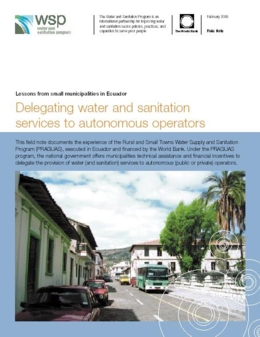
Delegating water and sanitation services to autonomous operators
07 Juli 2005
1.095
Lessons from small municipalities in Ecuador
Delegating water and sanitation services to autonomous operators
This field note documents the experience of the Rural and Small Towns Water Supply and SanitationProgram (PRAGUAS), executed in Ecuador and financed by the World Bank. Under the PRAGUASprogram, the national government offers municipalities technical assistance and financial incentives todelegate the provision of water (and sanitation) services to autonomous (public or private) operators.
WSP - Februari 2005
lihat selengkapnya
Delegating water and sanitation services to autonomous operators
This field note documents the experience of the Rural and Small Towns Water Supply and SanitationProgram (PRAGUAS), executed in Ecuador and financed by the World Bank. Under the PRAGUASprogram, the national government offers municipalities technical assistance and financial incentives todelegate the provision of water (and sanitation) services to autonomous (public or private) operators.
WSP - Februari 2005
lihat selengkapnya
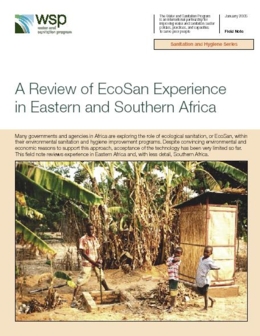
A Review of EcoSan Experience in Eastern and Southern Africa
07 Juli 2005
996
A Review of EcoSan Experience in Eastern and Southern Africa
Sanitation and Hygiene Series
WSP - Januari 2005
Many governments and agencies in Africa are exploring the role of ecological sanitation, or EcoSan, within their environmental sanitation and hygiene improvement programs. Despite convincing environmental and economic reasons to support this approach, acceptance of the technology has been very limited so far. This field note reviews experience in Eastern Africa and, with less detail, Southern Africa.
lihat selengkapnya
Sanitation and Hygiene Series
WSP - Januari 2005
Many governments and agencies in Africa are exploring the role of ecological sanitation, or EcoSan, within their environmental sanitation and hygiene improvement programs. Despite convincing environmental and economic reasons to support this approach, acceptance of the technology has been very limited so far. This field note reviews experience in Eastern Africa and, with less detail, Southern Africa.
lihat selengkapnya

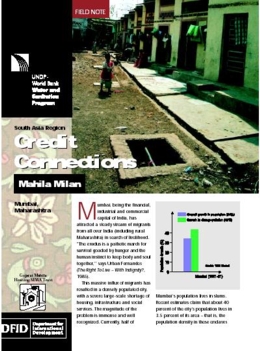
Credit Connections - Mumbai Maharashtra
07 Juli 2005
925
Credit Connections - Mumbai Maharashtra
Mahila Milan
UNDP-World Bank-WSP South Asia Region
1999
lihat selengkapnya
Mahila Milan
UNDP-World Bank-WSP South Asia Region
1999
lihat selengkapnya
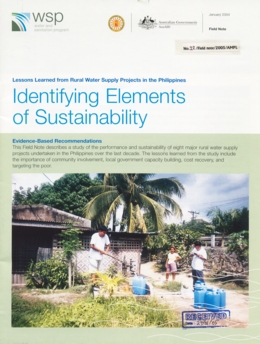
Identifying Elements of Sustainability - Lessons Learned from Rural Water Supply Projects in the Philippines
17 Juni 2005
918
Identifying Elements of Sustainability
Lessons Learned from Rural Water Supply Projects in the Philippines
Lessons Learned from Rural Water Supply Projects in the Philippines
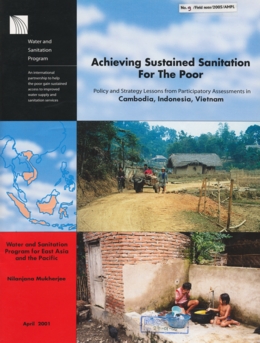
Achieving Sustained Sanitation for The Poor
17 Juni 2005
968
Achieving Sustained Sanitation for The Poor
Policy and Strategy Lessons from Participatory Assessments in Cambodia, Indonesia, Vietnam
Nilanjana Mukherjee
Water and Sanitation Program for East Asia and the Pacific, April 2001
Policy and Strategy Lessons from Participatory Assessments in Cambodia, Indonesia, Vietnam
Nilanjana Mukherjee
Water and Sanitation Program for East Asia and the Pacific, April 2001

Identifying Elements of Sustainability - Lessons Learned from Rural Water Supply Projects in the Philippines
WSP
4 Th.
951
A flood of aid during the international decade for water supply and sanitation (1980-1989)failed to provide universal access to safe water for all Filipinos. At the end of the decade less than 5 percent of the planned systems remained in operation, forcing national attention on the issue of service sustainablity. In response, a new generation of rural water supply projects emerged during the 1990s. These included eight major donor-funded projects that experimented with new approaches to financing and implementation. In 2003 a study by the Water Supply and Sanitation Performance Enhancement Project (WPEP) assessed the sustainability and performance of these projects.
Overall, the findings of the study suggest that projects with significant investments in capacity and institution building produced the most sustainable rural water supply systems. It also showed unequiocally that the involvemnet of the local government and communities aids the preparation, planning, implementation, and management of such systems, and that sustainability is improved when these processes are monitored by external agencies. The study suggests that the success of projects will require strengthening local capacity and building institutions to operate and maintain systems, developing mechanisms for cost recovery, explicitly targeting the needs of the poor, and providing more incentives for local investment.
The field note describes a study of the performance and sustainablity of eight major rural water supply projects undertaken in the Philippines over the last decade. The lessons learned from the study include the importance of community involvement, local government capacity building, cost recovery, and targeting the poor.
Overall, the findings of the study suggest that projects with significant investments in capacity and institution building produced the most sustainable rural water supply systems. It also showed unequiocally that the involvemnet of the local government and communities aids the preparation, planning, implementation, and management of such systems, and that sustainability is improved when these processes are monitored by external agencies. The study suggests that the success of projects will require strengthening local capacity and building institutions to operate and maintain systems, developing mechanisms for cost recovery, explicitly targeting the needs of the poor, and providing more incentives for local investment.
The field note describes a study of the performance and sustainablity of eight major rural water supply projects undertaken in the Philippines over the last decade. The lessons learned from the study include the importance of community involvement, local government capacity building, cost recovery, and targeting the poor.
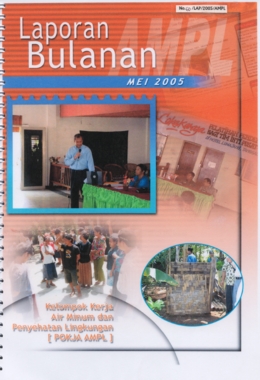
Laporan Bulanan Kelompok Kerja Air Minum dan Penyehatan Lingkungan (Pokja AMPL) - Mei 2005
Pokja AMPL
Th.
1.184
Laporan ini merupakan laporan bulanan kegiatan Kelompok Kerja Air Minum dan Penyehatan Lingkungan (Pokja AMPL) yang berisi garis besar hasil kegiatan, serta temuan penting dari kegiatan Pokja AMPL selama bulan Mei 2005. Selain itu, laporan ini juga memberikan informasi mengenai rencana kegiatan yang akan dilaksanakan pada bulan yang akan datang.
Daftar Isi:
Daftar isi
Daftar Lampiran
A. Sekretariat Pokja AMPL
I. Administrasi
II. Pusat Informasi AMPL
III. Produk Komunikasi Pokja AMPL
B. Kelompok Kerja AMPL
1. Ditjen Bangda, Departemen Dalam Negeri
2. Direktorat Jenderal PP-PL, Departemen Kesehatan
3. Direktorat Pemberdayaan Masyarakat Desa, Departemen Dalam Negeri
4. Direktorat Penyehatan Lingkungan dan Permukiman, Ditjen Cipta Karya
Departemen Pekerjaan Umum
C. Rencana Kegiatan Bulan Juni 2005
Daftar Isi:
Daftar isi
Daftar Lampiran
A. Sekretariat Pokja AMPL
I. Administrasi
II. Pusat Informasi AMPL
III. Produk Komunikasi Pokja AMPL
B. Kelompok Kerja AMPL
1. Ditjen Bangda, Departemen Dalam Negeri
2. Direktorat Jenderal PP-PL, Departemen Kesehatan
3. Direktorat Pemberdayaan Masyarakat Desa, Departemen Dalam Negeri
4. Direktorat Penyehatan Lingkungan dan Permukiman, Ditjen Cipta Karya
Departemen Pekerjaan Umum
C. Rencana Kegiatan Bulan Juni 2005
